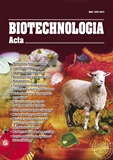ISSN 2410-7751 (Print)
ISSN 2410-776X (Online)

Biotechnologia Acta Т. 18, No. 3, 2025
P. 45-49 , Bibliography 11 , Engl.
UDC 579.61:612.017.11
doi: https://doi.org/10.15407/biotech18.03.045
B. ANIMALIS AND THE LECTIN OF B. SUBTILIS DIFFERENTLY REGULATE CYTOKINES PRODUCTION BY MACROPHAGES IN TUMOUR-BEARERS
N.I. Fedosova, N.L. Cheremshenko, S.V. Gogol, T.V. Symchych, I.M. Voyeykova, О.O. Lykhova, V.F. Chekhun
RE Kavetsky Institute of Experimental Pathology, Oncology and Radiobiology of the National Academy of Sciences of Ukraine, Kyiv
By producing a variety of soluble factors, including cytokines, macrophages (Mph) modulate the activity of other immune cells and have direct effects on cancer cells. This makes Mph a promising target for cancer immunotherapy.
Aim. This work purposed to study the effect of the simultaneous use of B. animalis and the lectin of B. subtilis on the production of some cytokines by Mph in tumour -bearing mice.
Materials and methods. Female Balb/c mice bearing solid Ehrlich adenocarcinoma (SEA) were treated with the lectin (s/c, 1 mg/kg body weight) or B. animalis (per os, 7×105 CFU/mouse) or with their combination. The lectin was isolated from the cultural fluid of B. subtilis ІМV В-7724. Lyophilized cells of B. animalis subsp. lactis BB-12 (Lek Pharmaceuticals, Slovenia) was used as a probiotic. On day 28 of tumour growth, Mph from the peritoneal cavity (pMph) and tumour nodule (tMph) were isolated and analyzed for TNF-α and IL-10 production.
Results. The pMph and tMph of untreated mice produced low levels of TNF-α (739.8 and 800.4 pg/mL respectively) and high levels of IL-10 (1169.8 and 1090.5 pg/mL respectively), the TNF-α/IL-10 ratio was 0.68 and 0.95 respectively. The lectin improved the TNF-α/IL-10 ratio to 1.13 (in the intact mice, it was 1.11). In the combined group, the effect was similar but less profound. The results of the B. animalis group did not differ from the untreated SEA group.
Conclusions. The changes in the production levels of cytokines indicate the lasting preservation of Mph functional activity in the tumour -bearers due to the influence of probiotics or their metabolites.
Keywords: macrophages, cytokines, B. animalis, bacterial lectin, cancer.
© Palladin Institute of Biochemistry of the National Academy of Sciences of Ukraine, 2025
References
1. Stavrou, M., Constantinidou, A. (2024). Tumour associated macrophages in breast cancer progression: implications and clinical relevance. Frontiers in Immunology, 15, 1441820. https://doi.org/10.3389/fimmu.2024.1441820
2. Xu, Y., Wang, X., Liu, L., Wang, J., Wu, J., Sun, C. (2022). Role of macrophages in tumour progression and therapy (Review). International Journal of Oncology, 60(5), 57. https://doi.org/10.3892/ijo.2022.5347
3. Chen, S., Saeed, A. F. U. H., Liu, Q., Jiang, Q., Xu, H., Xiao, G. G., Rao, L., Duo, Y. (2023). Macrophages in immunoregulation and therapeutics. Signal Transduction and Targeted Therapy, 8(1), 207. https://doi.org/10.1038/s41392-023-01452-1
4. Mosser, D. M., Hamidzadeh, K., Goncalves, R. (2021). Macrophages and the maintenance of homeostasis. Cellular & Molecular Immunology, 18(3), 579–587. https://doi.org/10.1038/s41423-020-00541-3
5. Al-Najjar, M. A. A., Abdulrazzaq, S. B., Alzaghari, L. F., Mahmod, A. I., Omar, A., Hasen, E., Athamneh, T., Talib, W. H., Chellappan, D. K., Barakat, M. (2024). Evaluation of immunomodulatory potential of probiotic conditioned medium on murine macrophages. Scientific Reports, 14(1), 7126. https://doi.org/10.1038/s41598-024-56622-0
6. Guo, N., Lv, L. L. (2023). Mechanistic insights into the role of probiotics in modulating immune cells in ulcerative colitis. Immunity, Inflammation and Disease, 11(10), e1045. https://doi.org/10.1002/iid3.1045
7. Fedosova, N. I., Cheremshenko, N. L., Hetman, K. I., Symchych, T. V., Chumak, A. V., Shliahovenko, V. O., Voyeykova, I. M., & Didenko, G. V. (2021). Physicochemical and cytotoxicity properties of Bacillus subtilis ІМV В-7724 extracellular lectin. Mikrobiolohichnyi Zhurnal, 83, 39–48. https://doi.org/10.15407/microbiolj83.01.039
8. Symchych, T. V., Chumak, A. V., Fedosova N. I., Cheremshenko, N. L., Karaman, О. М., Burlaka, А. P., Voyeykova, I. M. (2020). Functions of tumour -associated macrophages and macrophages residing in remote anatomical niches in Ehrlich carcinoma bearing mice. Experimental Oncology, 42(3), 197–203. https://doi.org/10.32471/exp-oncology.2312-8852.vol-42-no-3.14928
9. Habil, N., Al-Murrani, W., Beal, J., Foey, A. D. (2011). Probiotic bacterial strains differentially modulate macrophage cytokine production in a strain-dependent and cell subset-specific manner. Beneficial Microbes, 2(4), 283–293. https://doi.org/10.3920/BM2011.0027
10. Zhang, D. Y., Pan, Z. Y., Yu, X. K., Chen, Y. F., Gao, C. H., Yang, Y. T., Jiang, X. F., Li, N., Pan, J. P. (2019). Bifidobacterium lactis BB-12 Attenuates Macrophage Aging Induced by D-Galactose and Promotes M2 Macrophage Polarization. Journal of Immunology Iesearch, 4657928. https://doi.org/10.1155/2019/4657928
11. Zhao, C., Chen, H., Liang, H., Zhao, X., Tang, W., Wei, M., Li, Y., Zhang, J., …, Zhang, X. (2022). Lactobacillus plantarum RS-09 Induces M1-Type Macrophage Immunity Against Salmonella Typhimurium Challenge via the TLR2/NF-κB Signalling Pathway. Frontiers in Pharmacology, 13, 832245. https://doi.org/10.3389/fphar.2022.832245

